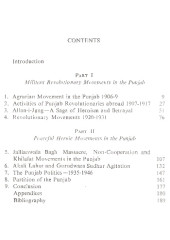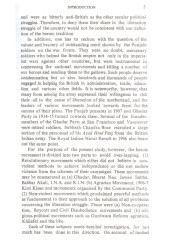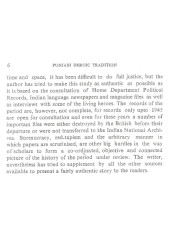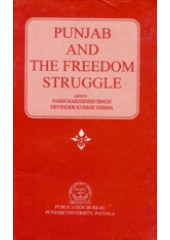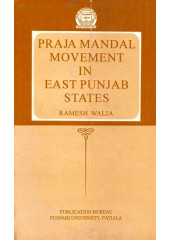Monday to Saturday - 10:00 Am to 9 PM
Now Enjoy Bulk Discounts on Books as Mentioned Below
These Discounts are in addition to the Discounts on Individual Books (Visible as Bulk Discount for Books in Cart)
Extra 10% Off If Books Purchased Exceeds Rs 3000 or 75 USD or 60 GBP or 60 Euro or 100 AUD or 100 CAD
Extra 15% Off If Books Purchased Exceeds Rs 6000 or 150 USD or 120 GBP or 120 Euro or 200 AUD or 200 CAD
Extra 20% Off If Books Purchased Exceeds Rs 15000 or 225 USD or 180 GBP or 180 Euro or 300 AUD or 300 CAD
Extra 25% Off If Books Purchased Exceeds Rs 30000 or 300 USD or 240 GBP or 240 Euro or 400 AUD or 400 CAD
Summary Of 'Punjabi Heroic Tradition' By Satya M Rai
To evaluate the heroic tradition of a people is, no doubt, a heroic task in itself. For one, the word heroic may mean different things to different people and secondly, heroism being a purely, subjective phenomenon may prove to be incapable of being measured or evaluated in objective terms. Furthermore, it is a quantity which has to be reckoned within a backdrop of both time and space geography, political and social conditions, moral values and even the prevailing ideological conceptions. The heroism of Bhagat Singh and his colleagues ( in a given situation of time and space ) which made them immortal in the eyes of the Indian people, was 'subversion' for the British and misguided enthusiam" ( under the influence of prevailing ideas ) for a section of the Indian people and national leadership. It is for the same reason that one looks it vain in the works of some of the Indian historians and statesmen, for an account on the supreme sacrifices and acts of great heroism displayed by the Simple Punjabi peasants organised, for example, in the Ghadar Movement. Reading the Sagha of Ghadar which struck terror in the hearts of our British rulers, one wonders why this glorious page of our history is missing form our historical and political writings. Jawaharlal Nehru 'discovered' India, but his discovery did not extend to the great movement of the Ghadarites except for minor reference at places. His 'Glimpses of World History,'did not show the 'glimpses' of the heroic struggles of the brave Kukas whose living bodies were tied to the mouths of British cannon and torn to bits with canon-shot or of the Babbar Akalis, the unsophisticated peasants of the Punjab; and again his autobiography traced the development of national movement in India, yet failed even to mention the above movements conceived, organised and executed by the Punjabi peasants in the purest spirit of self-sacrifice in the cause of the country's freedom. Why was this so? Why this omission on the part of Jawahar Lal Nehru and many other patriotic statesmen and historians? One answer may be the prevailing emphasis on non-violence, which made for a somewhat subdued treatment of patriotic movements based on violence.
A student of the history of heroic struggle in the punjab, however, cannot afford to ignore these movements which in fact are close to the Punjabi tradition and temper. Besides, the word 'heroic' brings forth daring fearless acts as Webster's Third, New International Dictionary defines it (1) arising from exhibiting or suggestive of boldness, spirit or daring (2) superemly noble, altruistic or self sacrificing. The Oxford Dictionary Gives the following meaning of this word: " having recourse to bold, daring or extreme measures, attempting great things". The word 'heroic, thus, underlines (a) bold, daring or extreme actions and (b) great, noble or altruistic irrespective of the mean adopted to achieve the end, contrary to what Gandhi made into a political creed.
The altruistic motives involving self-sacrifice for a particular, defined cause are the sin quo non of heroism. As Mazzini said in a critical article on Caryle's French Revolution:
"It is always due to some all moving principles for which hundreds and thousands of men fight, before which thrones totter, crowns are destroyed and created, existing ideals are shattered and new ideals break and forth and the sake of which vast masses of people think lightly of shadding scared human blood. The moving " spirit of revolution are deemed holy or unholy in proportion as the principle underlying them is beneficial or wicked. As in private life, so also in history, the deeds of an individual or a nation are judged by the character or the motive."
In consequence the heroic tradition in a country or a state means sacrifices that people living therein have made or are willing to make in a bold and consistent manner in a cause dear to them, for instance, achieving freedom or retaining it or reconstruction of a society with a view to improving the lot of millions of their fellow beings. Great men and women appear in the history of every nation who perform great deeds and are admired by the people through the ages. But there comes a period in the life of every nation when even ordinary men perform such deeds as Jawahar Lal Nehru has said:
Ordinary men and women are not usually heroic. They think of their daily bread and butter of their children, of think household worries and the like. But a time comes when a whole people become full of faith for a great cause, and then even simple, ordinary men and women become heroes, and history becomes stirring and cpochmaking. Great leaders have something in them which inspires a whole people and makes them do great deeds."
Table Of Contents For 'Punjabi Heroic Tradition' Book By Satya M Rai
|
Introduction |
||
|
|
PART I Militant Revolutionary Movements in the Punjab |
|
| 1. | Agrarian Movement in the Punjab 1906-9 | 9 |
| 2. | Activities of Punjab Revolutionaries abroad 1907-1917 | 27 |
| 3. | Allan-i-Jung-A Saga of Heroism and Betrayal | 51 |
| 4. | Revolutionary Movements 1920-1931 | 76 |
|
PART II Peaceful Heroic Movements in the Punjab |
||
| 5. | Jallianwala Bagh Massacre, Non-Cooperation and Khilafat Movements in the Punjab | 107 |
| 6. | Akali Lahar and Gurdwara Sudhar Agitation | 132 |
| 7. | The Punjab Politics-1935-1946 | 147 |
| 8. | Partition of the Punjab | 161 |
| 9. | Conclusion | 177 |
| Appendices | 180 | |
| Bibliography | 189 |
Punjabi Heroic Tradition - Book By Satya M Rai
- Brand: Punjabi-University-Patiala
- Product Code: SHE193
- Availability: Out Of Stock
-
Rs.130.00
Related Products
Sikhs in The Eighteenth Century - Book By Surjit Singh Gandhi
Table of Contents For 'Sikhs in The Eighteenth Century' - Book By Surjit Singh Gandhi ..
Rs.500.00
My Bleeding Punjab - Book By Khushwant Singh
Table of Contents For My Bleeding Punjab - Book By Khushwant Singh Content..
Rs.140.00
Martyrs of The Punjab - Vol 1 - Book By Parambakshish Singh , R K Ghai
Introduction of ‘Martyrs of The Punjab - Vol 1’ - Book By Parambakshish Singh , R K Ghai Martyrs ..
Rs.150.00
Punjab And The Freedom Struggle - Book By Parm Bakhshish Singh & Devinder Kumar Verma
Foreword To 'Punjab And The Freedom Struggle' By Parm Bakhshish Singh & Devinder Kumar Verma&nbs..
Rs.350.00
Who's Who Punjab Freedom Fighters - Vol 2 - Book By Professor Parm Bakhshish Singh
Foreword To The Book 'Who's Who Punjab Freedom Fighters - Vol 2' By Professor Parm Bakhshish Sing..
Rs.800.00
The Heroes Of Cellular Jail - Book By S.N.Aggarwal
From The Front Cover Of 'The Heroes Of Cellular Jail' By S.N.Aggarwal The book unfolds the saga o..
Rs.350.00
Praja Mandal Movement In East Punjab States - Book By Ramesh Walia
Foreword To The Book 'Praja Mandal Movement In East Punjab States' By Ramesh Walia I have gre..
Rs.200.00
Tryst With Terror - Book By V. N. Narayanan
Tryst With Terror - Punjab's Turbulent Decade - Book By V. N. Narayanan ..
Rs.95.00
Tags: book by satya m rai, punjabi heroic tradition sikh, history, and, books, english


